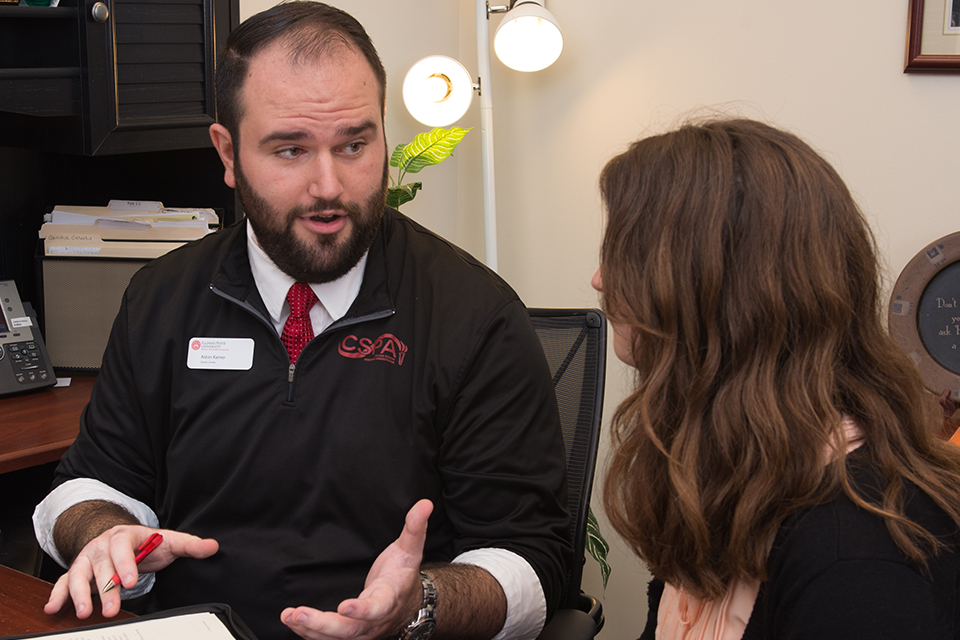Whether you are coming to the end of your undergraduate studies or you’re an alum thinking about going back to school to move your career forward, graduate school may be for you. There are many questions to ask yourself before you decide to attend and the application process can be a bit tricky. But there are ways to know if graduate school is right for you.
When considering graduate school, there are three main things to ask yourself:
- Should I attend graduate school?
- When should I go to graduate school?
- What are the benefits of graduate school that I need to consider?
Should I attend grad school?
Students or alumni may consider graduate school because they have “nothing better to do.” But by doing so, they may incur educational costs if they are unsure of their career goals. Meeting with a career advisor is one way Redbirds can identify their goals and set a path to achieve them.
When is a good time to go to grad school?
For those who are in a field that requires advanced degrees, the answer is now.
“It all relates to the career exploration piece,” Career Advisor Renee Carrigan said. “Some professions require a master’s program or doctorate degree and those who want to do those things should go right away after undergrad.”
Those who aren’t required to go to graduate school can use the time after graduation to buff their résumé and discover new interests to pursue in a graduate program.
What are the benefits I need to consider?
Redbirds interested in graduate school may want to consider whether to attend graduate school part-time or full-time. Each option has its benefits. Full-time students have the advantage of completing their degree faster, while part-time students may enjoy the benefits of working while continuing their education.
In addition, one needs to consider the cost of graduate school. Some graduate programs offer assistantships to full–time students which are paid through tuition waivers, stipends, or both. Part–time students may be able to work to fund their education or work for an employer that will help them pay for their continued education.
“There isn’t a one size fits all option,” Carrigan said. “There are many ways to attend graduate school, and meeting with your career advisor can help to narrow down the options.”
Searching
Once you have selected the path for graduate school the best fits you, it’s time to begin searching for programs and universities. Rachel Caracci, associate director of Illinois State University’s Graduate School recommends starting with a Google search of graduate programs in your desired profession.
“There are also other tools such as Petersons and USN and WR Grad School Rankings and Reviews that can help you find and compare programs,” she said. “Looking at websites and talking to faculty is a good way to understand what they are looking for in potential students.”
Many graduate programs are similar across schools but have different names. Check into the curriculum of each program to make sure the coursework is related to what you are wanting to do with the degree. Once you find a program and university, begin researching the admission qualifications.
According to Caracci, it is also a good idea to check if your program requires you to take any kind of exam such as the Graduate Record Examination (GRE). Taking the GRE and other exams can be a daunting task, so she recommends investigating them as early as possible.
Other admission requirements to consider are undergraduate GPA requirements, guidelines for personal statements and letters of recommendation, and transcript submission information.
Applying for graduate school
Once you identify the requirements for graduate school, it’s time to begin applying. There are three major parts that make up many graduate school applications:
- The personal statement
- Letters of recommendation
- Graduate assistantship applications
Personal statement
Each university and individual graduate program may have different requirements concerning personal statements. Phyllis McCluskey-Titus, professor and program coordinator for Illinois State’s College Student Personnel Administration graduate program, says that there are a few common questions to expect concerning personal statements. They are:
- Why are you interested in this program or university?
- What are your short- and long-term career goals?
- How will this program help you achieve those goals?
- What qualities do you possess that would make you a strong candidate for this program?
“Make sure you follow the directions for the personal statement that each program requires,” McCluskey-Titus said. “And be yourself, after all, it is a statement all about you!”
Letters of recommendation
As for letters of recommendation, it is important to make sure your writers match what the program seeks.
“Sometimes a program wants a faculty reference and a reference from someone in the program area,” McCluskey-Titus said. “They may also be looking for a reference from a job or internship as well. It is good practice to give your references a heads up before you submit your application and provide them with what they need to help them write your letter.”
Graduate assistantship applications
The last part of your application for graduate school is applying for a graduate assistantship. Based on the University and the program, assistantships may be required and may offer a variety of different benefits. Reaching out to the coordinator for your program is a good way to get answers on assistantships and to find out how to incorporate applying for them into your process.
Final steps
Now that you have all your required paperwork ready, it is time to submit them. Make sure to double-check each part of your application to be sure it meets the requirements. Be prepared to pay an application fee upon submission. Lastly, know what kind of admissions style the graduate programs you are applying to use.
For example, a rolling admissions program reviews application up until the deadline and may fill all the spots in the program before that deadline. Other programs may wait until the deadline before they review applications. It is always best to submit your application ahead of the deadline, as an early submission shows your time management skills and can prevent you from being put on a waiting list.
After you submit your applications, you may need to wait for a couple of months before you get your answer. Once your acceptance letters arrive, decide which program is the best fit for you. Don’t forget to thank your references for writing letters for you and inform them of your decision. It is good practice to maintain your professional relationships, especially since they are helping you to succeed.
If you’re considering graduate school, there are many resources available to assist you with your decision. First, attend the Career Center’s Graduate School Series. Second, schedule an appointment with your career advisor using Hire-A-Redbird. They can review your personal statements, help you apply to assistantship positions, and even help you brainstorm and search for the best fit program for you. Third, check out the Graduate School Guide, which covers the A to Z’s of applying to graduate school.
With some of the big questions about graduate school out of the way, you should be ready to begin your search! Be inquisitive and stay determined. The process may be difficult, but it is very worth it in the end.
Kyle Abel is a Career Center career ambassador and a senior studying business administration. Connect with him on LinkedIn.


